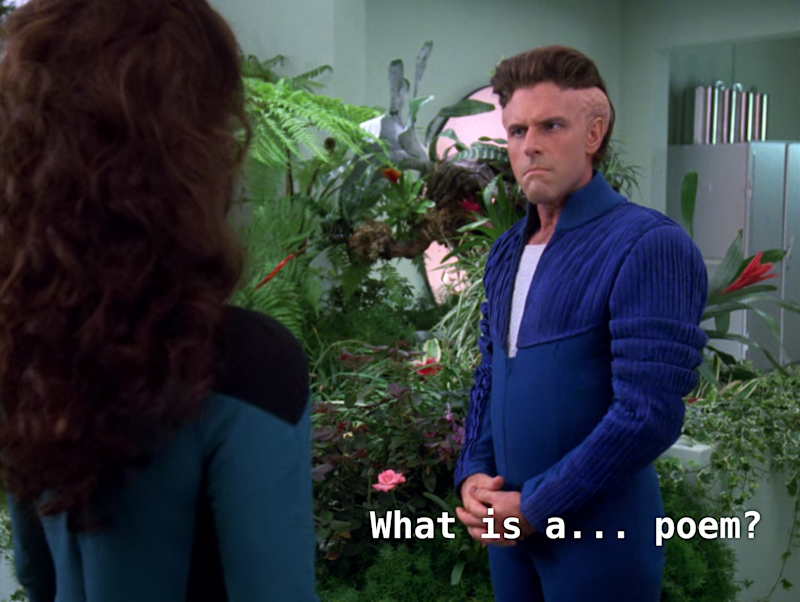Essay
Poetry’s So Common Hardly Anyone Can Find It
4/4/2022
C.C.

“I can’t get at the poem of this.” That’s a line from C. ’81 by Alice Notley. The instant I read it, I was transported to a new understanding of Poetry.
Beyond a form of writing, Poetry is a kind of essence that you can sometimes find or try to find or can’t find. Sometimes the person who finds poetic essence is so moved they try to translate it into a form to share with others. The most common sharing-form is the poem, which means poems alone do not define the whole of Poetry.
Emily Dickinson was intensely interested in the definition of Poetry, writing “To see the Summer Sky / Is Poetry, though never in a Book it lie—” Alice Notley defined Poetry as the surface and texture and play of being; Audre Lorde: the way we help give name to the nameless so it can be thought; Franco “Bifo” Berardi: the excess that goes beyond our world; Merriam-Webster: a concentrated imaginative awareness of experience.
While the words are different, the sentiment is the same: Poetry is more than a literary form. Poetry is the essence of inner feelings and thoughts as they relate to the external world. Poetry is found and observed; it is not a creation. If there was a more specific definition, it would cease to be Poetry.
Stephen Spender defined poetry as an original moment of insight. My moment of insight was witnessing Alice Notley struggle to get at the poem of something and then recognizing there was poetic essence in the struggle. Reading the line felt like catching sight of another world.
Poetry happens before poem-making, and poems of the literary genre are only one form of poetic translation. In the margins of my copy of Sister Outsider by Audre Lorde, I rediscovered my note scribbled during a previous reading: the poem is not the only form of poetry. Because I was moved enough by this insight to make an in situ note, I can trace the beginnings of my current thinking to a few years ago when I read Lorde’s “Poetry is Not a Luxury.” However, my thinking back then was still confined to aesthetic output.
Poem-making is like summarizing the plot of a movie, retelling a dream, or explaining an internet meme in person—all things I do but not very well. It’s never the same as the real thing. Language can’t fully convey the vision, and whatever a poem communicates, it is “probably a feeble shadow of the original conception,” as Percy Bysshe Shelley believed.
While a poem is not the original vision, a poem can influence a new vision, as C. ’81 did for me. What that single line showed me was that anything has the capability of possessing Poetry.
Poetry is so common, hardly anyone can find it—another line from C. ’81—but constantly finding it would require an amount of attention we’re incapable of sustaining. D.H. Lawrence wrote that it is easier to make poems than to maintain attention, and although it is more difficult, he believed attention was the most essential act for truly living.
Our known world is finite, but it exists alongside an unknown infinite world that contains all other possibilities. We can catch fleeting glimpses into the infinite world using what Mary Oliver defined as a perfectly serious cautious state of mind, neither conscious nor unconscious. Chika Sagawa experienced the glimpses as the precise snapping together of those two worlds.
May Sarton wrote about the energy shifting tensions the intersection creates as an anxious stirring because “one is bothered by something one needs to understand.” If I give something my full awareness, I can physically feel new energy “as if the top of my head were taken off,” in Emily Dickinson’s words. It is like full awareness is a key that unlocks a door to the world’s mysteries that wasn’t accessible to my human consciousness before.
Being a fully attentive observer of poetic essence all the time would be an impossible condition to live in. Especially since there has to be regular non-poetic things around for Poetry to even exist. Poetry is any chaos that breaks through the order of non-poetry, revealed by “unexpected moments of empathy” towards something “that seems enormously important,” as Elizabeth Bishop framed it.
Empathy is an instinct, like attention, that we often suppress because too much of it is overwhelming. Feelings are ignored and overlooked as potential evidence-based resources, but since they are a part of the human experience, it seems possible that they are essential tools in both the construction of our world and our understanding of it. Using that tool to access possible alternatives might help us fix what’s not working.
The Poetry we eventually observe expands our understanding of our world. In that sense, poetic essence might be useful in other areas of society more directly beyond art: science, government, education, healthcare. The Poetry we never find will always be part of another world we’ll never know. I started with Alice Notley’s words, so I’ll end with them too: “The poetry we can’t find is a whole new earth.”
C.C.
uses text, image, performance, and sound to write poetry.Are.na Blog
Learn about how people use Are.na to do work and pursue personal projects through case studies, interviews, and highlights.
See MoreYou can also get our blog posts via email